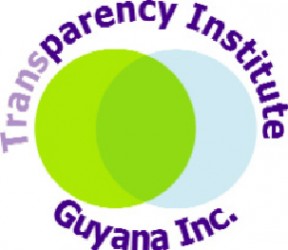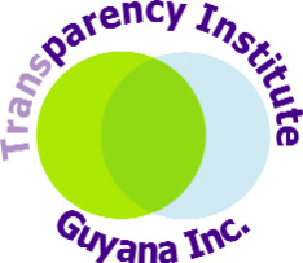Transparency International defines corruption as the abuse of entrusted power for private gain. This essentially refers to a situation where someone misuses his or her authority to engage in actions from which he or she benefits. It may be a traffic police officer who asks for a bribe; a project officer who uses project assets for personal use; or a Minister of government who demands a fee for a contract to be issued. Large (grand) or small (petty), and irrespective of who initiates it, corruption is wrong and it is a criminal act.
Guyana has seen an upsurge in activities and events which has resulted in corruption being discussed publically and more constructively than in the past. The Transparency Institute Guyana Inc. (TIGI) has publically lauded the Government for taking actions to withdraw the Memorandum of Understanding with Natural Globe Inc. Internationally, we have witnessed unprecedented efforts by ordinary citizens, watchdog bodies and governments, to hold the corrupt to account. For example, this year, about 150,000 demonstrators took to the streets in several Brazilian cities in opposition to corruption and the billions of dollars of spending on football World Cup preparations.
Corruption is not unique to Guyana. It happens everywhere but what exactly does the anti-corruption agenda mean for us Guyanese as a people and for the country? What follows are six key points of learning that TIGI believes that every Guyanese should know.
 1. Guyanese are paying a high price: One of the most difficult things about corruption is trying to understand how bad it is – exactly how much money, people and agencies are involved. Understanding the corruption situation in a country is very important, as it is an important first step that empowers us to address the problem. Because many international efforts are focussed on corruption, we know more than we did in the past and we now have some data that help to educate us on the state of corruption. The Corruption Perception Index (CPI) is a tool used to measure corruption globally.
1. Guyanese are paying a high price: One of the most difficult things about corruption is trying to understand how bad it is – exactly how much money, people and agencies are involved. Understanding the corruption situation in a country is very important, as it is an important first step that empowers us to address the problem. Because many international efforts are focussed on corruption, we know more than we did in the past and we now have some data that help to educate us on the state of corruption. The Corruption Perception Index (CPI) is a tool used to measure corruption globally.
Unlike many of our Caribbean neighbours, Guyana has done poorly in the CPI exercise over the years. From 2005 when the CPI was introduced here, we have continued to register increasingly low scores. In 2005 we ranked 117 (out of 159 countries), in 2009 we placed 126 (out of 180 countries) and in 2011 we were at 134 (out of 183 countries). Last year (2012) we placed 133 out of 176 countries, and this year (2013) we find ourselves with our lowest rank to date: 136 out of 177 countries. The numbers aside, corruption may be even bigger than we imagine, as there may be many corrupt practices that have not yet been brought to the public’s attention.
2. Guyanese are paying a high price: Corruption has a high cost and it is usually not the corrupt officials who pay the price. In December 2013, a local newspaper article stated that the Ministry of Education had overpaid contractors by G$1.5 million. This may not necessarily be the result of corruption, but it does show that if large sums of money are misspent then they are not used for the purpose that is intended, such as providing education to children, and health care for the sick and elderly. Corruption also has a cost to businesses since the greater the cost of doing business in Guyana, the less will companies want to invest here and create much needed jobs for young people.
It is, however, not only the public who pays for corruption but also increasingly corrupt officials are being brought to justice. In 2013, Ralph Seeram quoted President Ramotar as saying that “I will fire any cabinet minister guilty of corruption.” In neighbouring Brazil they are not just talking about it, they are doing just that. This year the Economist reported on the guilty verdict of José Dirceu (former Chief of staff to former President Lula and at one time the “second most powerful man in Brazil”) in an article titled “Jailed at Last” (November 23, 2013):
Few Brazilians believed that Mr. Dirceu, who resigned, would be charged, let alone convicted or jailed in a country where impunity for politicians has long been the norm. But on November 15th the supreme-court president, Joaquim Barbosa, issued warrants for the arrest of Mr. Dirceu and 11 others among the 25 found guilty last year of, variously, bribery, money-laundering, misuse of public funds and conspiracy, in a case known to Brazilians as the mensalão (big monthly stipend).
3. Most Guyanese are OK with corruption: As bad as it is, and despite the fact that it has a high cost, a surprising number of Guyanese do not have a problem with corruption. The 2010 Latin American Public Opinion Poll (LAPOP), conducted by Vanderbilt University in 26 countries, found that 78.5% of the Guyanese surveyed perceived corruption to be high. In the same LAPOP study, 32.3% of Guyanese responded positively to the statement, “Given the way things are, sometimes paying a bribe is justified”. This response placed Guyana as the highest of any other country in the Latin America and the Caribbean where the population is amenable to bribery.
As long as Guyanese citizens send a message to corrupt officials and to the Government that they accept corruption, the situation will not change.
4. It is not unconstitutional, or “political” to talk about it in Guyana: Corruption is an issue that affects all citizens irrespective of race, economic status, gender, religion, or political persuasion. As such, it is an issue that is of the public interest, especially since it often involves the use of public funds. It is not a “political” issue in the sense that, if someone criticizes his or her government, a ministry, project or practice of being corrupt, then it does not mean that he or she has a political agenda. On the contrary, each citizen has a civic responsibility to improve Guyana for the next generation. Therefore, if you are an anti-corruption advocate then you are also pro-Guyana, and you are demonstrating your interest in Guyana’s socio-economic development and our future.
The government has a legal obligation to investigate corruption in the public sector, and to prosecute public officials who have been found guilty of corruption. The onus is therefore not on the public to find evidence of corruption and provide it to the government. The public also has a right to know about corruption in public office and to maintain its faith in the government that it is doing what is right by the people.
Organizations like TIGI have publically stated that they are not “against the government” rather they are “against corruption”. They see the government as an important partner in the fight against corruption. So when politicians complain that persons are anti-government, remember that it is not about them, it is about us.
5. We have committed ourselves to do something about corruption: Guyana is a signatory to two key international anti-corruption conventions – United Nations Convention against Corruption (UNCAC) and the Inter-American Convention against Corruption ratified in 2008 and 2000 respectively. By making international commitments, Guyana has essentially committed to fighting corruption. In 2013, on “International Right to Know day”, UNCAC called on signatories, like Guyana, to:
Move faster to implement transparency commitments;
Remember their obligations to translate key transparency measures into law and to apply and enforce them;
Adopt and implement comprehensive access to information legislation; and
Recognize that secrecy of company ownership is a key factor facilitating corruption and requested states to collect beneficial ownership information through national-level public registers of companies and trusts.
6. Change is possible: There have been heartening developments around the world, and even in the Caribbean, of governments and citizens working diligently to develop their countries through a process of good, fair and accountable government. Ordinary citizens are more involved more than ever in anti-corruption and gradually they are transforming their communities and their countries. Every Guyanese should know that they can change the situation in Guyana. It is not as hopeless as you think.
What can you do? TIGI recommends that you educate yourself on what corruption is, establish your own opinion on the issues, and get involved in efforts that help to reduce corruption in Guyana. Please visit our face book page for more information, or call our office at + 592 231 9586.






